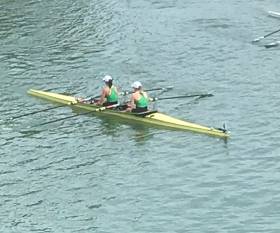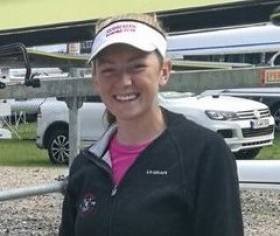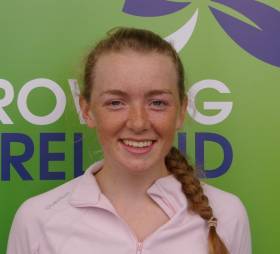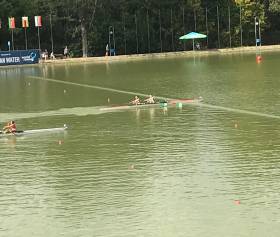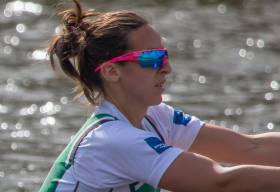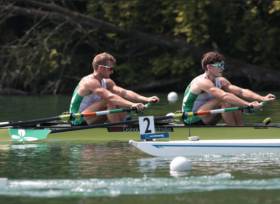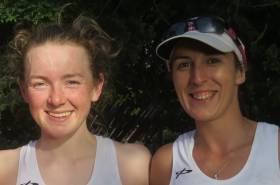Displaying items by tag: Aoife Casey
Fast Finish But Walsh and Casey Finish Fifth in C Final
#Rowing: Ireland's lightweight double of Aoife Casey and Denise Walsh took fifth in their C Final, 17th overall at the World Rowing Championships in Linz-Ottensheim this morning. China were strong winners. Ireland came from sixth to fifth in the second half of the race. They had the fastest final 500 metres but were held out of fourth by Germany - by .68 of a second.
World Rowing Championshiops, Linz-Ottensheim, Day Seven (Irish interest)
Women
Lightweight Double Sculls - C Final (Places 13 to 18) 1 China 7:00.82; 5 Ireland (A Casey, D Walsh) 7:10.52.
#Rowing: Aoife Casey and Denise Walsh finished third in their C/D Semi-Final at the World Championships and qualified for the C Final. China, Germany and Ireland held that order through the great bulk of the race, but Ireland closed hard on Germany coming to the line, missing out on catching them by just .18 of a second.
World Rowing Championships, Linz-Ottensheim, Austria - Day Five (Irish interest)
Men
Lightweight Double Sculls - A/B Semi-Final Two (First Three to A Final; rest to B Final): 1 Ireland (F McCarthy, P O'Donovan) 6:13.46, 2 Germany 6:13.59, 3 Norway 6:14.15.
Lightweight Single Sculls A/B Semi-Final One (First Three to A Final; rest to B Final): 6 Ireland (G O'Donovan) 7:34.01.
Women
Four A/B Semi-Final Two (First Three to A Final; rest to B Final): 1 Australia 6:25.34, 2 Denmark 6:28.58, 3 Romania 6:30.96; 4 Ireland (T Hanlon, E Lambe, A Keogh, E Hegarty) 6:32.37.
Pair - A/B Semi-Final One (First Three to A Final; rest to B Final): 1 New Zealand 6:57.92, 2 United States 7:01.78, 3 Italy 7:01.80; 4 Ireland (A Crowley, M Dukarska) 7:03.05.
Lightweight Double Sculls - C/D Semi-Final One (First Three to C Final; rest to D Final): 3 Ireland (A Casey, D Walsh) 7:01.68.
Lightweight Single Sculls A/B Semi-Final One (First Three to A Final; rest to B Final): 6 Ireland (L Heaphy) 7:42.23.
Casey and Walsh Take Their Place in Quarter-Finals in Linz
#Rowing: Aoife Casey and Denise Walsh finished fourth in their heat and qualified for the quarter-finals of the lightweight double sculls at the World Rowing Championships in Linz, Austria. The top three in the race will all have ambitions of taking a medal come next weekend: France won from South Africa and China. Walsh and Casey did enough to stay clear of Thailand and nab the final qualification spot.
World Rowing Championships, Linz, Austria, Day One (Irish interest)
Men
Pair – Heat One (First Four to Quarter-Finals; rest to Repechage): 6 Ireland (M O’Donovan, S O’Driscoll) 6:50.51.
Lightweight Double Sculls – Heat Three (First Three to Quarter-Finals; rest to Repechage): 1 Ireland (F McCarthy, P O’Donovan) 6:28.02
Women
Pair – Heat Four (First Four to Quarter-Finals; rest to Repechage): 2 Ireland (A Crowley, M Dukarska) 7:13.30
Lightweight Double Sculls – Heat Four (First Four to Quarter-Finals; rest to Repechage): 4 Ireland (A Casey, D Walsh) 7:25.62.
#Rowing: The lightweight double of Aoife Casey and Cliodhna Nolan became the third Ireland boat to qualify for an A Final at the World Under-23 Championships today.
They won their repechage. Two boats would go to the A Final, and Ireland took over the lead after 1,000 metres and refused to yield despite strong charges by Britain and the Netherlands. The Dutch landed the valuable second spot.
World Rowing Under-23 Championships (Irish interest)
Women
Lightweight Double Sculls – Repechage (First Two to A Final; rest to B Final): 1 Ireland (A Casey, C Nolan) 6:54.54, 2 Netherlands 6:54.76; 3 Britain (1 F Chestnutt) 6:55.86.
#Rowing: Ireland’s lightweight double scull of Aoife Casey and Cliodhna Nolan finished fourth in their heat at the World Under-23 Championships in Florida today and must negotiate a repechage as they target a place in the A Final.
The top two in this heat qualified for the final. Switzerland took first and Germany won a battle with the Netherlands to take second. Casey and Nolan came in ahead of Fiona Chestnutt and Chloe Knight, representing Britain.
The programme was suspended because of thunderstorms. The revised schedule, if it goes ahead, has placed the remaining races for Ireland crews in late afternoon, local time. Florida is five hours ahead of Ireland.
World Rowing Under-23 Championships, Sarasota Bradenton, United States (Irish interest)
Women
Lightweight Double Sculls – Heat One (First two to A Final; rest to Repechage) 1 Switzerland 6:59.78, 2 Germany 7:02.65; 4 Ireland (A Casey, C Nolan) 7:07.28, 5 Britain (1 F Chestnutt) 7:13.48.
Casey and Walsh Finish World Championships With C Final Win
#Rowing: Ireland’s Aoife Casey and Denise Walsh showed the Skibbereen skill for sprinting to good effect as they worn their C Final of the women’s lightweight double sculls at the World Championships in Plovdiv. They were fourth at 500 metres, but they sped up the rankings through the middle 1,000 and led with 500 metres to go. They took it home from there, with Austria second and Germany third. Ireland placed 13th in the World because of this result.
Shane O’Driscoll and Mark O’Donovan took fourth in their C Final, 16th overall, in the men’s pair. The race was won by Australia’s Andrew Judge and Joseph O’Brien, while O’Donovan and O’Driscoll produced a remarkable change of pace to challenge the leaders, but Poland and the United States had pushed in between them and the leaders on the line.
World Rowing Championships, Plovdiv, Bulgaria, Day Seven (Irish interest):
Men
Pair – C Final (places 13 to 18): 1 Australia 6:23.81; 4 Ireland (M O’Donovan, S O’Driscoll) 6:29.19.
Lightweight Double Sculls – A Final: 1 Ireland (G O’Donovan, P O’Donovan) 6:06.81, 2 Italy 6:08.31, 3 Belgium 6:11.25.
Women
Pair – A Final: 1 Canada 6:50.67, 2 New Zealand 6:52.96, 3 Spain 7:04.60; 6 Ireland (A Keogh, E Hegarty) 7:15.70.
Lightweight Double Sculls – C Final (places 13 to 18): 1 Ireland (A Casey, D Walsh) 7:05.77, 2 Austria 7:08.29, 3 Germany 7:09.12.
Casey and Walsh Win C/D Semi-Final at World Rowing
#Rowing: Aoife Casey and Denise Walsh won their C/D Semi-Final and qualfied for the C Final at the World Rowing Championships in Plovdiv today. The first two would go to the C Final, and it was clear early in the race that these would be Spain and Ireland. Thailand trailed this two. Spain led and looked set to win – but Casey and Walsh won the battle at the head of the field with Spain.
World Rowing Championships, Plovdiv, Bulgaria, Day Five (Irish interest)
Men
Pair – Quarter-Final Four (Three to A/B Semi-Finals; rest to C/D Semi-Finals): 1 Canada 6:26.04, 2 New Zealand 6:30.36, 3 Czech Republic 6:35.01; 5 Ireland (M O’Donovan, S O’Driscoll) 6:44.28.
Double Sculls – Repechage Four (First Two to A/B Semi-Final):
Ireland (P Doyle, R Byrne) 6:16.96, 2 Bulgaria 6:20.15.
Lightweight Double – Semi-Final Two (Three to A Final; rest to B Final): 1 Italy 6:21.94, 2 Belgium 6:22.83, 3 Ireland (G O’Donovan, P O’Donovan) 6:23.78.
Women
Pair – Semi-Final (Three to A Final; rest to B Final): 1 Ireland (A Keogh, E Hegarty) 7:14.67, 2 Italy 7:14.99, 3 Spain 7:15.30.
Lightweight Double Sculls – C/D Semi-Final (First Two to C Final; rest to D Final): 1 Ireland (A Casey, D Walsh) 7:20.51, 2 Spain 7:24.08.
Walsh and Casey Just Miss Out on Semi-Final Place at World Rowing
#Rowing: Denise Walsh and Aoife Casey took third in their repechage of the lightweight double sculls at the World Rowing Championships in Bulgaria this morning. Switzerland, who won well, and Japan took the top two places and qualified for the A/B Semi-Finals. Walsh and Casey were fourth for much of the race, but passed Austria in the final sprint, though they were unable to get past Japan. Ireland is now set for the C/D Semi-Finals.
World Rowing Championships, Plovdiv, Bulgaria, Day Three (Irish interest)
Women
Lightweight Double Sculls – Repechage One (First Two to A/B Semi-Finals; rest to C/D Semi-Finals): 1 Switzerland 6:57.90, 2 Japan 7:00.67; 3 Ireland (A Casey, D Walsh) 7:03.88.
O'Donovans Speed into Quarter-Finals at World Rowing Championships
#Rowing: Ireland’s Paul O’Donovan and Gary O’Donovan won their heat with a sparkling performance at the World Rowing Championships in Plovdiv. Germany’s newly-formed lightweight double of Jonathan Rommelmann and Konstantin Steinhuebel seemed set to give the Ireland crew a test, leading through half way and 1500 metres. But the O’Donovans had much better base speed and left their rivals behind in the final quarter. Portugal and Argentina also qualified for the quarter-finals.
Denise Walsh and Aoife Casey finished fourth in their heat of the lightweight double sculls. The first two positions were the valuable ones, as they secured a place in the semi-finals. New Zealand, Australia and Canada fought it out, with New Zealand’s Zoe McBride and Jackie Kiddle securing a clear first, while Australia edged Canada out by .34 of a second. Walsh and Casey were over 10 seconds further back.
The women’s pair of Aifric Keogh and Emily Hegarty qualified from their heat for the semi-finals, finishing second, while the men’s pair (fifth) and double (second) will have to compete in repechages.
World Rowing Championships, Plovdiv, Bulgaria, Day One (Irish interest)
Men
Pair – Heat Four (First Four to Quarter-Finals; rest to Repechage): 1 Canada 6:20.46, 2 South Africa 6:21.85, 3 France 6:25.43, 4 Belarus 6:28.22; 5 Ireland (M O’Donovan, S O’Driscoll) 6:29.10
Double Sculls – Heat One (Winner to A/B Semi-Final; rest to Repechages): 1 New Zealand 6:02.23; 2 Ireland (P Doyle, R Byrne) 6:12.61
Lightweight Double Sculls – Heat Five (First Four to Quarter-Finals; rest to Repechage): 1 Ireland (G O’Donovan, P O’Donovan) 6:15.79, 2 Germany 6:19.23, 3 Portugal 6:21.55, 4 Argentina 6:30.24.
Women
Pair – Heat One (First Three to A/B Semi-Final; rest to Repechage): 1 New Zealand 6:56.06, 2 Ireland (A Keogh, E Hegarty) 7:11.51, 3 United States 7:13.02.
Lightweight Double Sculls – Heat Three (First Two to A/B Semi-Finals; rest to Repechages): 1 New Zealand 6:50.04, 2 Australia 6:51.11; 4 Ireland (A Casey, D Walsh) 7:02.25.
#Rowing: Denise Walsh and Aoife Casey gave Irish fans plenty to cheer about at the European Rowing Championships in Strathclyde Park in Scotland. The Ireland lightweight double fought it out with Germany in an exciting B Final. Germany’s Leonie Pless and Katrin Thoma led at halfway, but Walsh and Casey pushed into that lead for the remaining 1,000 metres. As they crews came to the line, cheered on by the crowd, Ireland upped the rate. The Germans held out and won by one-third of a length.
European Rowing Championships, Day Four (Irish interest)
Women
Lightweight Double Sculls – B Final (Places 7 to 11): 1 Germany 7:11.14, 2 Ireland (A Casey, D Walsh) 7:11.77, 3 Austria 7:15.63.


























